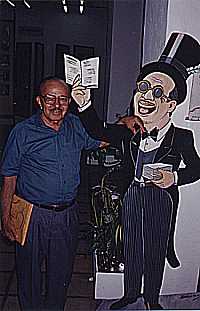CUÍCA DE SANTO AMARO POETA-REPÓRTER
DA BAHIA.
Salvador da Bahia: Fundação
Casa de Jorge Amado, 1990, 197 pp. Preface
by Jorge Amado.
 Part One treats
“Cuíca the man, the poet, the popular reporter” and is based on interviews,
newspaper and magazine articles and the poet’s own statements in his poems. Part Two is an anthology of excerpts from Cuíca’s
documental cordel on Bahia and the nation.
Cuíca is the opposite side of the coin of his contemporary and
competitor, Rodolfo Coelho Cavalcante: he is the “Hell’s Mouth,” [Boca
do Inferno] of Bahian cordel from 1940 to 1964.
A popular, semi-literate Gregório de Matos from the masses, Cuíca wrote
biting satire on local scandal which got him into trouble, and only appeals to
friends with “pull” and even to President Getúlio Vargas managed to keep
him out of hot water and even then, not all the time.
Part One treats
“Cuíca the man, the poet, the popular reporter” and is based on interviews,
newspaper and magazine articles and the poet’s own statements in his poems. Part Two is an anthology of excerpts from Cuíca’s
documental cordel on Bahia and the nation.
Cuíca is the opposite side of the coin of his contemporary and
competitor, Rodolfo Coelho Cavalcante: he is the “Hell’s Mouth,” [Boca
do Inferno] of Bahian cordel from 1940 to 1964.
A popular, semi-literate Gregório de Matos from the masses, Cuíca wrote
biting satire on local scandal which got him into trouble, and only appeals to
friends with “pull” and even to President Getúlio Vargas managed to keep
him out of hot water and even then, not all the time.
He considered himself first of all a poet-reporter who writes of events
on the local and national scene, but he was also a propagandist, a sandwich
board man who hawked products for local stores
in verse and was a sort of “town
crier” advertising local goings-on. But
Cuíca used the term “propagandist” in another way: he wrote “paid”
cordelian poems to expose scandal and report
“certain facts” that the major dailies avoided.
He accepted bribes and used poetic “extorsion” in these poems, so, as
a result, he was thrown in jail and was often in physical danger from irate,
real-life characters in his poems. But
the public of Bahia loved him and anxiously awaited each week’s new
“bomb.” He made life in Bahia
much more interesting both to humble folks
and middle and upper class people who bought his poems on the dock at the
bay, the bus or train station or in front of the Lacerda Elevator in the lower
city.
But Cuíca also became known for documenting local and national politics
from World War II to 1964. He
condemned Mussolini, Hitler and Stalin to cordelian hell, but praised Getúlio
Vargas and his pro-workers’ legislation to the sky.
He had the nerve and the verve to report any event of importance, local
or national, in the booklets of cordel which were always sought out on
the streets of Bahia for a quarter of a century.